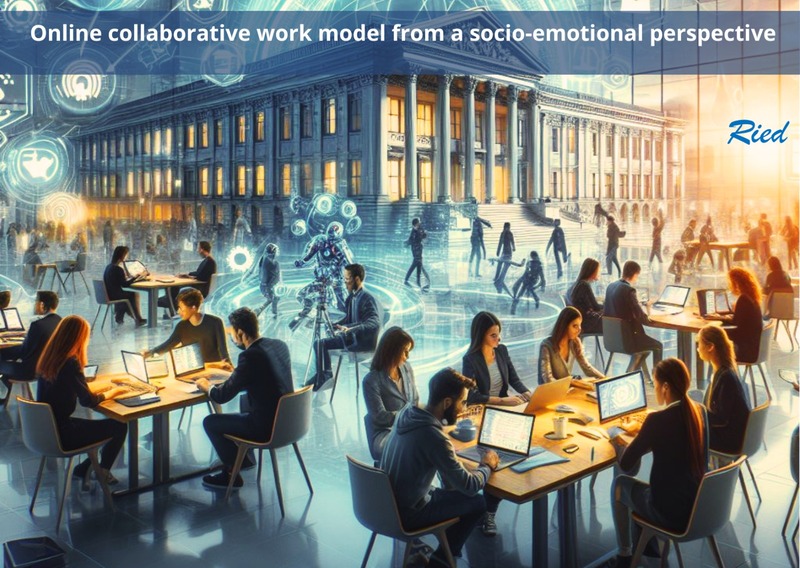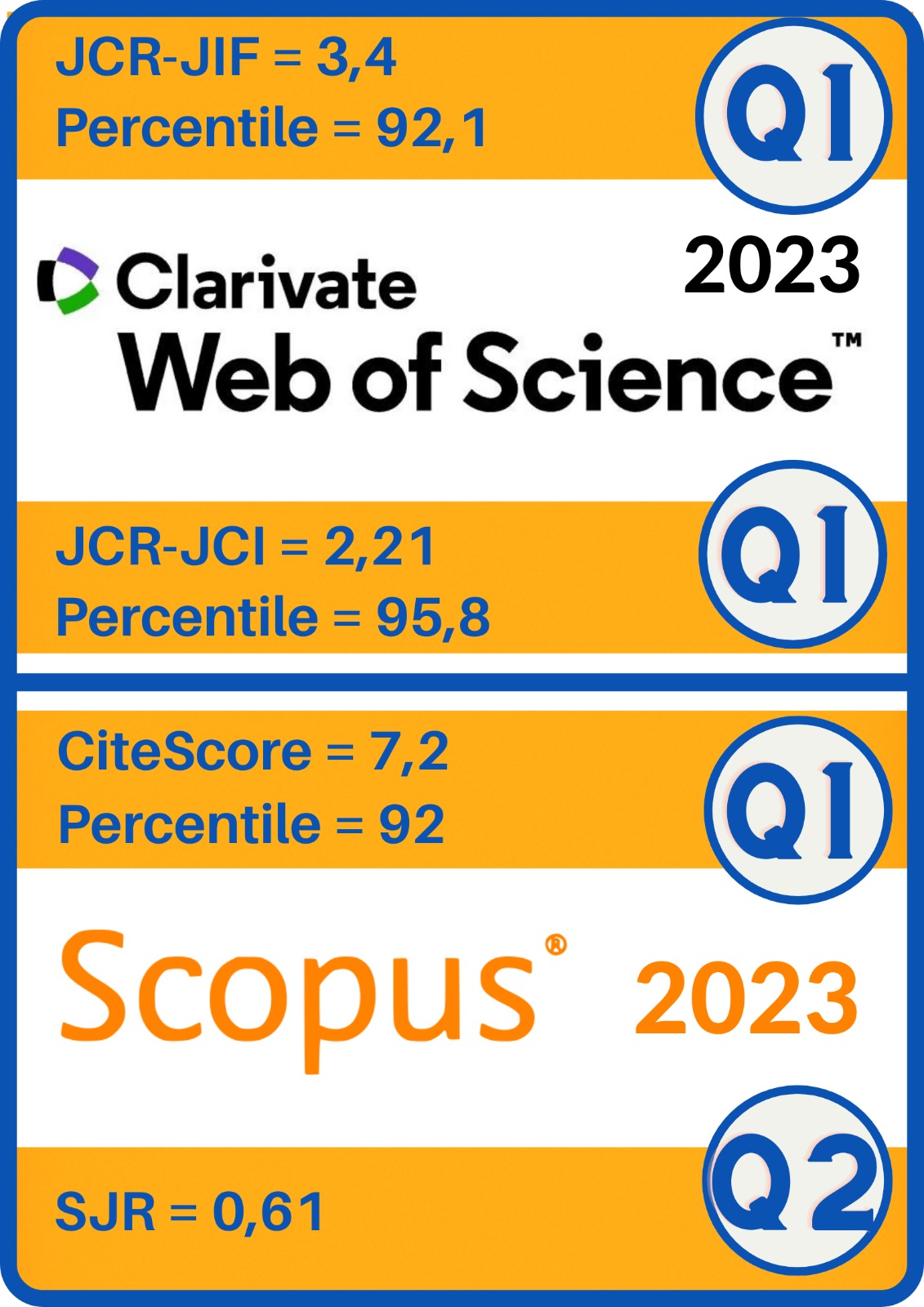Modelo de Trabalho Colaborativo Online na Perspectiva Socioemocional
DOI:
https://doi.org/10.5944/ried.27.2.39115Palavras-chave:
trabalho em equipe, emoção, auto-controle, influência social, comunicação, conflitoResumo
O facto de um grupo de estudantes online trabalhar em conjunto numa tarefa académica não é sinónimo de o fazerem de forma colaborativa. Para que os alunos consigam atuar dessa forma (e para que os professores consigam evocá-lo), obtendo assim melhores resultados de sua aprendizagem, é fundamental compreender como ocorre essa interação acadêmica. O objetivo desta pesquisa é validar um modelo de fatores que nos permita compreender como os alunos contribuem para a dinâmica do trabalho em equipe a partir de uma perspectiva socioemocional. A amostra é composta por 722 alunos de mestrado em gestão. É aplicado um questionário composto em sua maioria por itens extraídos de instrumentos que são referência para mensuração da inteligência emocional. Os fatores propostos são especificados da seguinte forma: Autocontrole, Influência pessoal, Comunicação abrangente, Trabalho em equipe e Gestão de conflitos. O modelo obtido é testado ajustado por Análise Fatorial Confirmatória. Observam-se diferenças significativas entre o sexo feminino e Trabalho em equipe, Influência pessoal e Comunicação abrangente; bem como entre maiores de 30 anos e Gestão de Conflitos, Trabalho em Equipe e Influência Pessoal. Os resultados esclarecem como: a) elevar e melhorar esta dimensão pedagógica na universidade; b) orientar melhor os alunos para que melhorem a sua contribuição específica para o trabalho em equipe.
Downloads
Referências
Baird, N., & Benson, A. J. (2022). Getting Ahead While Getting Along: Followership as a Key Ingredient for Shared Leadership and Reducing Team Conflict. Frontiers in Psychology, 13. https://doi.org/10.3389/fpsyg.2022.923150
Bar-On, R. (1997). Bar-On Emotional Quotient Inventory (EQ-i): A measure of emotional intelligence. Multi-Heath Systems.
Beal, D. J., Cohen, R. R., Burke, M. J., & McLendon, C. L. (2003). Cohesion and Performance in Groups: A Meta-Analytic Clarification of Construct Relations. Journal of Applied Psychology, 88(6), 989-1004. https://doi.org/10.1037/0021-9010.88.6.989
Bisquerra, R., & Pérez-Escoda, N. (2007). Las competencias emocionales. Educación XXI, 10, 61-82. https://doi.org/10.5944/educxx1.1.10.297
Blau, I., Shamir-Inbal, T., & Avdiel, O. (2020). How does the pedagogical design of a technology-enhanced collaborative academic course promote digital literacies, self-regulation, and perceived learning of students? The Internet and Higher Education, 45, 100722. https://doi.org/10.1016/j.iheduc.2019.100722
Bonny, J. W. (2023). Self-report and facial expression indicators of team cohesion development. Behavior Research Methods, 55(1), 1-15. https://doi.org/10.3758/s13428-022-01799-3
Bourner, J., Hughes, M., & Bourner, T. (2001). First-year Undergraduate Experiences of Group Project Work. Assessment & Evaluation in Higher Education, 26(1), 19-39. https://doi.org/10.1080/02602930020022264
Burleson, B. R. (2003). Emotional support skills. In Handbook of Communication and Social Interaction Skills (pp. 569-612). Routledge. https://doi.org/10.4324/9781410607133-22
Contreras, F., Baykal, E., & Abid, G. (2020). E-Leadership and Teleworking in Times of COVID-19 and Beyond: What We Know and Where Do We Go. Frontiers in Psychology, 11. https://doi.org/10.3389/fpsyg.2020.590271
Curran, P. J., West, S. G., & Finch, J. F. (1996). The Robustness of Test Statistics to Nonnormality and Specification Error in Confirmatory Factor Analysis. Psychological Methods, 1(1), 16-29. https://doi.org/10.1037/1082-989X.1.1.16
Fernandez-Berrocal, P., Extremera, N., & Ramos, N. (2004). Validity and Reliability of the Spanish Modified Version of the Trait Meta-Mood Scale. Psychological Reports, 94(3), 751-755. https://doi.org/10.2466/pr0.94.3.751-755
Fitzgerald, D. B. (2013). The use of the Communication Checklist-Adult (CC-A) for assessing the communication abilities of individuals post traumatic brain injury. https://ro.ecu.edu.au/theses_hons/115
Gagnon, S., & Monties, V. (2023). Interpersonal emotion regulation strategies: Enabling flexibility in high-stress work environments. Journal of Organizational Behavior, 44(1), 84-101. https://doi.org/10.1002/job.2660
Gardner, H. (1983). Frames of mind. Basic Books.
Goleman, D. (1999). Que define a un líder. Harvard Business Review, 29, 1-16.
Goleman, D., Boyatzis, R., & Hay, G. (1999). Emotional Competence Inventory. Hay Group.
Griffith, J. A., Connelly, S., & Thiel, C. E. (2014). Emotion regulation and intragroup conflict: when more distracted minds prevail. International Journal of Conflict Management, 25(2), 148-170. https://doi.org/10.1108/IJCMA-04-2012-0036
Hsu, N., Newman, D. A., & Badura, K. L. (2022). Emotional Intelligence and Transformational Leadership: Meta-Analysis and Explanatory Model of Female Leadership Advantage. Journal of Intelligence, 10(4), 104. https://doi.org/10.3390/jintelligence10040104
Hu, W., Huang, Y., Jia, Y., & Ma, N. (2021). Exploring the Relationship Between Socio-emotional Process and Collaborative Problem Solving. Proceedings of the 13th International Conference on Education Technology and Computers, 437-443. https://doi.org/10.1145/3498765.3498834
Huang, R., Kahai, S., & Jestice, R. (2010). The contingent effects of leadership on team collaboration in virtual teams. Computers in Human Behavior, 26(5), 1098-1110. https://doi.org/10.1016/j.chb.2010.03.014
Huang, X., & Lajoie, S. P. (2023). Social emotional interaction in collaborative learning: Why it matters and how can we measure it? Social Sciences and Humanities Open, 7(1). Elsevier Ltd. https://doi.org/10.1016/j.ssaho.2023.100447
Järvelä, S., & Bannert, M. (2021). Temporal and adaptive processes of regulated learning - What can multimodal data tell? Learning and Instruction, 72, 101268. https://doi.org/10.1016/j.learninstruc.2019.101268
Järvenoja, H., & Järvelä, S. (2005). How students describe the sources of their emotional and motivational experiences during the learning process: A qualitative approach. Learning and Instruction, 15(5), 465-480. https://doi.org/10.1016/j.learninstruc.2005.07.012
Kazemitabar, M., Lajoie, S. P., & Doleck, T. (2022). A process model of team emotion regulation: An expansion of Gross’ individual ER model. Learning, Culture and Social Interaction, 33, 100612. https://doi.org/10.1016/j.lcsi.2022.100612
Mesa Rave, N., Gómez Marín, A., & Arango Vásquez, S. I. (2023). Escenarios colaborativos de enseñanza-aprendizaje mediados por tecnología para propiciar interacciones comunicativas en la educación superior. RIED-Revista Iberoamericana de Educación a Distancia, 26(2), 259-282. https://doi.org/10.5944/ried.26.2.36241
Montalvo, A., & Ávila, S. (2023). Propiedades Psicométricas de un Cuestionario para evaluar el desarrollo competencial de Auto Liderazgo Socio-Emocional en la Modalidad Online de la Formación Superior Universitaria. Digital Education Review, 43(1). https://doi.org/10.1344/der.2023.43.114-130
Montalvo-García, A. (2021). La efectividad de los programas de desarrollo competencial emocional en la universidad [Unpublished doctoral dissertation]. Facultat de Psicologia, Ciencies de l’Educació i de l’Esport Blanquerna. Universitat Ramon Llull. Barcelona.
Montalvo-García, A., Vila, S. A., Pérez, C. T., & Longo, F. (2022). Modelo de Comunicación Integral Online en la Universidad. In Conference proceedings. CIVINEDU 2022: 6th International Virtual Conference on Educational Research and Innovation (pp. 58-63). REDINE (Red de Investigación e Innovación Educativa).
Näykki, P., Järvelä, S., Kirschner, P. A., & Järvenoja, H. (2014). Socio-emotional conflict in collaborative learning—A process-oriented case study in a higher education context. International Journal of Educational Research, 68, 1-14. https://doi.org/10.1016/j.ijer.2014.07.001
Nguyen, A., Järvelä, S., Rosé, C., Järvenoja, H., & Malmberg, J. (2023). Examining socially shared regulation and shared physiological arousal events with multimodal learning analytics. British Journal of Educational Technology, 54(1), 293-312. https://doi.org/10.1111/bjet.13280
Petrides, K. V. (2009). Psychometric properties of the trait emotional intelligence questionnaire (TEIQue). In C. Stough, D. H. Saklofske & J. D. A. Parker (Eds.), Assessing emotional intelligence: Theory, research, and applications (pp. 85-101). NY: Springer Science + Business Media. https://doi.org/10.1007/978-0-387-88370-0_5
Rogat, T. K., & Adams-Wiggins, K. R. (2015). Interrelation between regulatory and socioemotional processes within collaborative groups characterized by facilitative and directive other-regulation. Computers in Human Behavior, 52, 589-600. https://doi.org/10.1016/j.chb.2015.01.026
Saccardi, I., & Masthoff, J. (2023). Adapting Emotional Support in Teams: Emotional Stability and Productivity. UMAP 2023 - Adjunct Proceedings of the 31st ACM Conference on User Modeling, Adaptation and Personalization, 253-265. https://doi.org/10.1145/3563359.3597385
Schutte, N. S., Malouff, J. M., Hall, L. E., Haggerty, D. J., Cooper, J. T., Golden, C. J., & Dornheim, L. (1998). Development and validation of a measure of emotional intelligence. Personality and Individual Differences, 25(2), 167-177. https://doi.org/10.1016/S0191-8869(98)00001-4
Su, Y., Li, Y., Hu, H., & Rosé, C. P. (2018). Exploring college English language learners’ self and social regulation of learning during wiki-supported collaborative reading activities. International Journal of Computer-Supported Collaborative Learning, 13(1), 35-60. https://doi.org/10.1007/s11412-018-9269-y
Wang, X., Liu, S., & Feng, W. (2022). How leader humor stimulates subordinate boundary-spanning behavior: A social information processing theory perspective. Frontiers in Psychology, 13. https://doi.org/10.3389/fpsyg.2022.956387
Wetcho, S., & Na-Songkhla, J. (2022). An Investigation of Pre-Service Teachers Using Mobile and Wearable Devices for Emotion Recognition and Social Sharing of Emotion to Support Emotion Regulation in mCSCL Environments. Contemporary Educational Technology, 14(2), ep359. https://doi.org/10.30935/cedtech/11668
Yu, X., Zhang, L., Liu, M., & He, B. (2023). The Effect of Empathy on Team Members’ Moqi in Virtual Teams: A Moderated Mediation Model. Psychology Research and Behavior Management, 16, 2619-2633. https://doi.org/10.2147/PRBM.S414860
Zha, S., & Ottendorfer, C. L. (2011). Effects of Peer-Led Online Asynchronous Discussion on Undergraduate Students’ Cognitive Achievement. American Journal of Distance Education, 25(4), 238-253. https://doi.org/10.1080/08923647.2011.618314
Zhang, S., Chen, J., Wen, Y., Chen, H., Gao, Q., & Wang, Q. (2021). Capturing regulatory patterns in online collaborative learning: A network analytic approach. International Journal of Computer-Supported Collaborative Learning, 16(1), 37-66. https://doi.org/10.1007/s11412-021-09339-5
Zhao, Y., Yu, T., & Zhang, Z. (2023). The influence of team motivational climate on employee creativity—mediating role of domain-relevant skills. Frontiers in Psychology, 14. https://doi.org/10.3389/fpsyg.2023.1177778
Zhu, Y., Zhang, J. H., Au, W., & Yates, G. (2020). University students’ online learning attitudes and continuous intention to undertake online courses: a self-regulated learning perspective. Educational Technology Research and Development, 68(3), 1485-1519. https://doi.org/10.1007/s11423-020-09753-w
Zirar, A., Muhammad, N., Upadhyay, A., Kumar, A., & Garza-Reyes, J. A. (2023). Exploring lean team development from the Tuckman’s model perspective. Production Planning & Control, 1-22. https://doi.org/10.1080/09537287.2023.2275693

Downloads
Publicado
Como Citar
Edição
Secção
Licença

Este trabalho encontra-se publicado com a Licença Internacional Creative Commons Atribuição 4.0.







